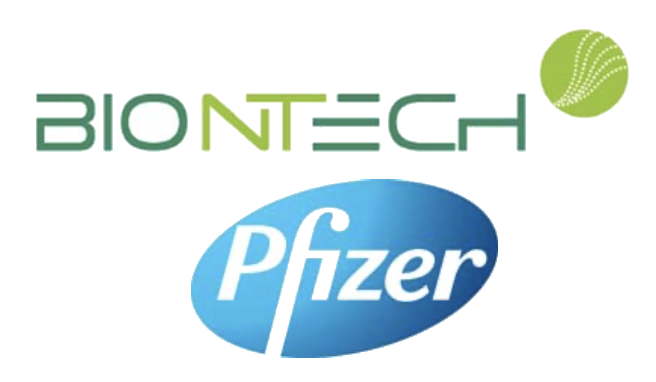Collaboration Agreement between Pfizer and BioNTech
BioNTech Signs Collaboration Agreement with Pfizer to Develop mRNA-based Vaccines for Prevention of Influenza
Mainz, Germany, and NEW YORK, August 16, 2018 – BioNTech AG, a rapidly growing biotechnology company focused on precise immunotherapies for the treatment of cancer and infectious disease, today announced that it has entered into a multi-year research and development (R&D) collaboration with Pfizer Inc. (NYSE: PFE) to develop mRNA-based vaccines for prevention of influenza (flu).
Under the terms of the agreement, BioNTech and Pfizer will jointly conduct research and development activities to help advance mRNA-based flu vaccines. Pfizer will assume sole responsibility for further clinical development and commercialization of mRNA-based flu vaccines, following BioNTech’s completion of a first in human clinical study.
BioNTech will receive $120 million in upfront, equity and near-term research payments and up to an additional $305 million in potential development, regulatory and commercial milestone payments. In addition, BioNTech will receive up to double-digit tiered royalty payments associated with worldwide sales if the program reaches commercialization.
BioNTech is an industry leader in mRNA vaccine approaches with validated science, innovative manufacturing expertise and a broad understanding of the clinical applications of this technology.
“Today’s agreement with Pfizer is one of a number of steps that we are taking to rapidly build a sustainable R&D presence in infectious disease, combining our deep understanding of the immune system to treat disease with the cutting-edge technologies and significant infrastructure that we have built-up over many years to develop immunotherapy treatments,” said Prof. Dr. Ugur Sahin, Co-Founder and CEO of BioNTech. “A significant presence in infectious disease supports our goal of building a global immunotherapy company that provides more effective and precise immune-mediated approaches for the prevention and treatment of serious illnesses, such as the prevention of flu and the treatment of cancer.”
Kathrin Jansen, Senior Vice President and Head of Pfizer’s Vaccine Research and Development Unit said, “Innovative vaccine approaches are urgently needed to provide improved protection against seasonal flu, and to respond rapidly and in quantity to pandemic influenza threats. mRNA vaccines offer a novel approach to code for any protein or multiple proteins, and the potential to manufacture higher potency flu vaccines more rapidly and at a lower cost than contemporary flu vaccines. BioNTech is one of the industry leaders in mRNA technology and we are looking forward to working closely with them to help bring cutting-edge mRNA influenza vaccines to the market to improve people’s lives.”
Pfizer pays BioNTech $120M upfront to form mRNA flu vaccine pact
By Nick Paul Taylor Aug 16, 2018 6:33am
Pfizer has struck a $425 million deal to work with BioNTech on the development of mRNA influenza vaccines. The Big Pharma is providing $120 million in upfront and near-term payments to enter into the R&D collaboration.
Germany’s BioNTech has established itself at the forefront of the mRNA field, leading to deals with Eli Lilly, Genentech and Sanofi and a $270 million series A. Many of the collaborations, plus BioNTech’s internal programs, are using mRNA to activate the immune system against tumors. But the approach could also yield prophylactic vaccines that are more potent and easier to make than existing shots.
The vaccines will deliver RNA encoding for an antigen. Once the antigen is produced, it induces T cell responses that prime the immune system to spot the protein. The approach could cut the time it takes to develop and manufacture vaccines in response to emerging pandemic threats, and induce protection against multiple proteins.
BioNTech has talked up the idea for several years but has been occupied by its oncology programs. Now, Pfizer is stepping up to get the project motoring forward.
“mRNA vaccines offer a novel approach to code for any protein or multiple proteins, and the potential to manufacture higher potency flu vaccines more rapidly and at a lower cost than contemporary flu vaccines,” Kathrin Jansen, head of Pfizer’s vaccine R&D unit, said in a statement.
The agreement sees Pfizer pay $120 million in upfront, equity and near-term research payments. Further down the line, Pfizer could hand over up to $305 million in development, regulatory and commercial milestones, although as ever, caveats abound as to whether this will be met.
BioNTech and Pfizer will collaboratively take the mRNA vaccines through the early R&D steps. Once a first-in-human study is complete, Pfizer will take sole responsibility for advancing the vaccines through the rest of clinical development.
The deal establishes Pfizer at the forefront of efforts to create mRNA flu vaccines but it is far from the only company interested in using the technology to prevent infectious diseases. Moderna has two influenza vaccines in its clinical pipeline and has generated early-phase data suggesting the mRNA concept works.
